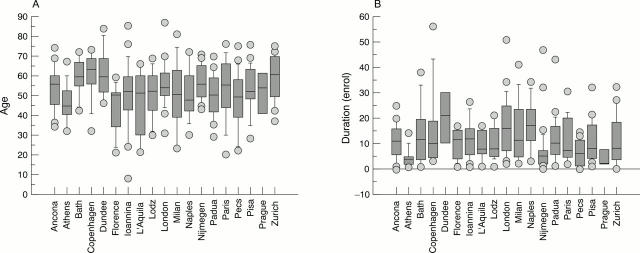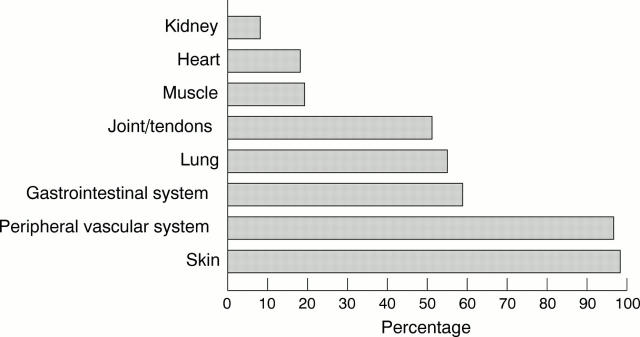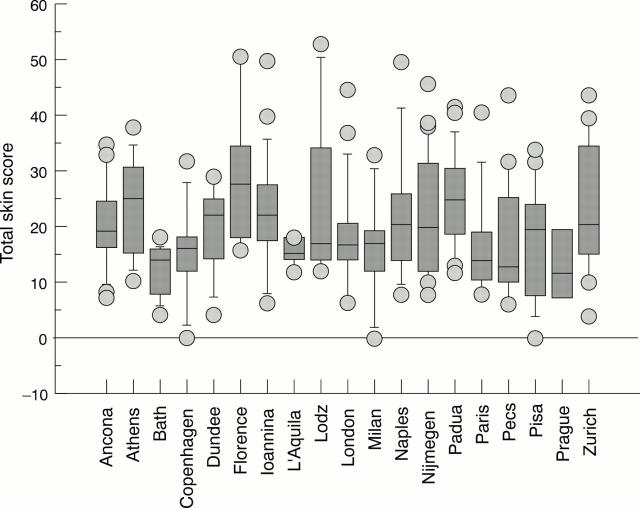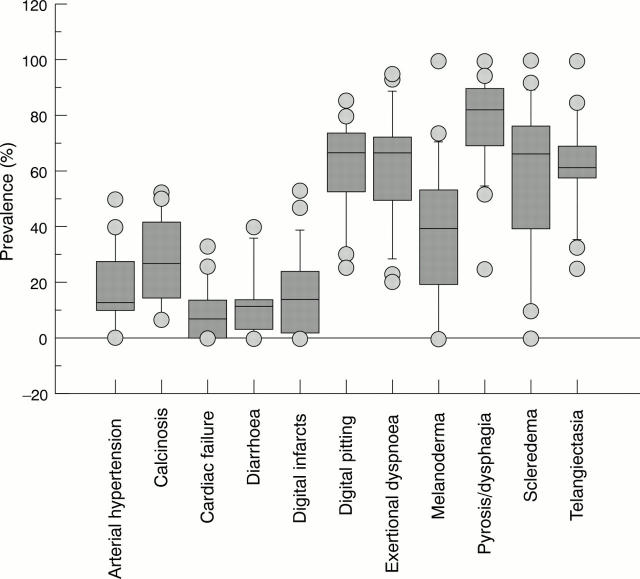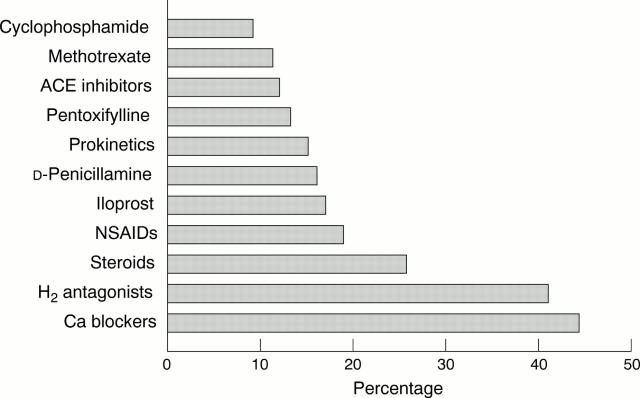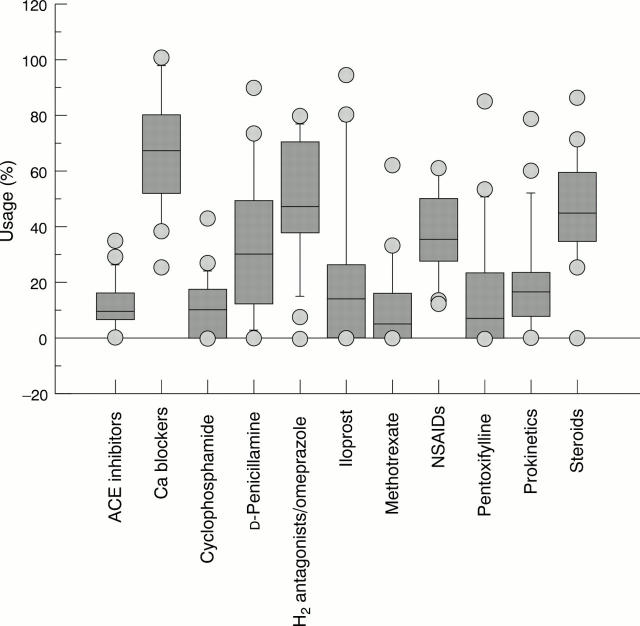Abstract
OBJECTIVE—To investigate the existence of differences among European referral centres for systemic sclerosis (SSc) in the pattern of attendance and referral and in the clinical and therapeutical approaches. METHODS—In 1995 the European Scleroderma Study Group initiated a multicentre prospective one year study whose aim was to define the disease activity criteria in SSc. During the study period each participating European centre was asked to enrol consecutive patients satisfying American College of Rheumatology criteria for SSc and to fill out for each of them a standardised clinical chart. Patients from various centres were compared and differences in epidemiological, clinical, and therapeutical aspects were analysed. RESULTS—Nineteen different medical research centres consecutively recruited 290 patients. The patients could be divided into two subgroups: 173 with the limited (lSSc) and 117 with the diffuse (dSSc) form of the disease. The clinical and serological findings for the series of 290 patients seemed to be similar to data previously reported. However, when the data were analysed to elicit any differences between the participating centres, a high degree of variability emerged, in both epidemiological and clinical features and in the diagnostic and therapeutic approaches to the disease. CONCLUSIONS—The clinical approach to SSc, not only in different countries but also in different centres within the same country, is not yet standardised. To overcome this problem, it will be necessary for the scientific community to draw up a standardised procedure for the management of patients with SSc. This would provide a common research tool for different centres engaged in research on this complex disease.
Full Text
The Full Text of this article is available as a PDF (172.9 KB).
Figure 1 .
Distribution of the patients by (A) age at enrolment and (B) disease duration among the different centres. In the box plots the 10th, 25th, 50th (median), 75th, and 90th centiles for each variable are shown. Values above the 90th and below the 10th centiles are plotted as points.
Figure 2 .
Cumulative prevalence of organ involvement based on data from the patient history section—that is, collected at the time of entry into the study.
Figure 3 .
Distribution of the total skin score among the different centres. In the box plots the 10th, 25th, 50th (median), 75th, and 90th centiles for each variable are shown. Values above the 90th and below the 10th centiles are plotted as points.
Figure 4 .
Distribution of clinical features among the different centres as emerged by data collected in section II (clinical and instrumental investigations carried out at the entry into the study). In the box plots the 10th, 25th, 50th (median), 75th, 90th centiles for each variable are shown. Values above the 90th and below the 10th centiles are plotted as points.
Figure 5 .
Drug treatment being used in the patient series at the time of enrolment.
Figure 6 .
Treatments used by the different centres. In the box plots the 10th, 25th, 50th (median), 75th, and 90th centiles of each variable are shown. Values above the 90th and below the 10th centiles are plotted as points.
Selected References
These references are in PubMed. This may not be the complete list of references from this article.
- Akesson A., Scheja A., Lundin A., Wollheim F. A. Improved pulmonary function in systemic sclerosis after treatment with cyclophosphamide. Arthritis Rheum. 1994 May;37(5):729–735. doi: 10.1002/art.1780370518. [DOI] [PubMed] [Google Scholar]
- Akesson A., Wollheim F. A. Organ manifestations in 100 patients with progressive systemic sclerosis: a comparison between the CREST syndrome and diffuse scleroderma. Br J Rheumatol. 1989 Aug;28(4):281–286. doi: 10.1093/rheumatology/28.4.281. [DOI] [PubMed] [Google Scholar]
- Barnett A. J., Miller M. H., Littlejohn G. O. A survival study of patients with scleroderma diagnosed over 30 years (1953-1983): the value of a simple cutaneous classification in the early stages of the disease. J Rheumatol. 1988 Feb;15(2):276–283. [PubMed] [Google Scholar]
- Black C. M., Denton C. P. The management of systemic sclerosis. Br J Rheumatol. 1995 Jan;34(1):3–7. doi: 10.1093/rheumatology/34.1.3. [DOI] [PubMed] [Google Scholar]
- Chandran G., Smith M., Ahern M. J., Roberts-Thomson P. J. A study of scleroderma in South Australia: prevalence, subset characteristics and nailfold capillaroscopy. Aust N Z J Med. 1995 Dec;25(6):688–694. doi: 10.1111/j.1445-5994.1995.tb02854.x. [DOI] [PubMed] [Google Scholar]
- Clements P. J., Lachenbruch P. A., Ng S. C., Simmons M., Sterz M., Furst D. E. Skin score. A semiquantitative measure of cutaneous involvement that improves prediction of prognosis in systemic sclerosis. Arthritis Rheum. 1990 Aug;33(8):1256–1263. doi: 10.1002/art.1780330828. [DOI] [PubMed] [Google Scholar]
- Ferri C., Bernini L., Cecchetti R., Latorraca A., Marotta G., Pasero G., Neri R., Bombardieri S. Cutaneous and serologic subsets of systemic sclerosis. J Rheumatol. 1991 Dec;18(12):1826–1832. [PubMed] [Google Scholar]
- Giordano M., Valentini G., Migliaresi S., Picillo U., Vatti M. Different antibody patterns and different prognoses in patients with scleroderma with various extent of skin sclerosis. J Rheumatol. 1986 Oct;13(5):911–916. [PubMed] [Google Scholar]
- Jacobsen S., Halberg P., Ullman S., Van Venrooij W. J., Høier-Madsen M., Wiik A., Petersen J. Clinical features and serum antinuclear antibodies in 230 Danish patients with systemic sclerosis. Br J Rheumatol. 1998 Jan;37(1):39–45. doi: 10.1093/rheumatology/37.1.39. [DOI] [PubMed] [Google Scholar]
- Kahaleh M. B., Sultany G. L., Smith E. A., Huffstutter J. E., Loadholt C. B., LeRoy E. C. A modified scleroderma skin scoring method. Clin Exp Rheumatol. 1986 Oct-Dec;4(4):367–369. [PubMed] [Google Scholar]
- Kuwana M., Kaburaki J., Okano Y., Tojo T., Homma M. Clinical and prognostic associations based on serum antinuclear antibodies in Japanese patients with systemic sclerosis. Arthritis Rheum. 1994 Jan;37(1):75–83. doi: 10.1002/art.1780370111. [DOI] [PubMed] [Google Scholar]
- Lally E. V., Jimenez S. A., Kaplan S. R. Progressive systemic sclerosis: mode of presentation, rapidly progressive disease course, and mortality based on an analysis of 91 patients. Semin Arthritis Rheum. 1988 Aug;18(1):1–13. doi: 10.1016/0049-0172(88)90030-3. [DOI] [PubMed] [Google Scholar]
- LeRoy E. C., Black C., Fleischmajer R., Jablonska S., Krieg T., Medsger T. A., Jr, Rowell N., Wollheim F. Scleroderma (systemic sclerosis): classification, subsets and pathogenesis. J Rheumatol. 1988 Feb;15(2):202–205. [PubMed] [Google Scholar]
- Medsger T. A., Jr, Masi A. T. Epidemiology of systemic sclerosis (scleroderma). Ann Intern Med. 1971 May;74(5):714–721. doi: 10.7326/0003-4819-74-5-714. [DOI] [PubMed] [Google Scholar]
- Nagy Z., Czirják L. Predictors of survival in 171 patients with systemic sclerosis (scleroderma). Clin Rheumatol. 1997 Sep;16(5):454–460. doi: 10.1007/BF02238937. [DOI] [PubMed] [Google Scholar]
- Pignone A., Matucci-Cerinic M., Lombardi A., Fedi R., Fargnoli R., De Dominicis R., Cagnoni M. High resolution computed tomography in systemic sclerosis. Real diagnostic utilities in the assessment of pulmonary involvement and comparison with other modalities of lung investigation. Clin Rheumatol. 1992 Dec;11(4):465–472. doi: 10.1007/BF02283100. [DOI] [PubMed] [Google Scholar]
- Preliminary criteria for the classification of systemic sclerosis (scleroderma). Subcommittee for scleroderma criteria of the American Rheumatism Association Diagnostic and Therapeutic Criteria Committee. Arthritis Rheum. 1980 May;23(5):581–590. doi: 10.1002/art.1780230510. [DOI] [PubMed] [Google Scholar]
- Steen V. D., Costantino J. P., Shapiro A. P., Medsger T. A., Jr Outcome of renal crisis in systemic sclerosis: relation to availability of angiotensin converting enzyme (ACE) inhibitors. Ann Intern Med. 1990 Sep 1;113(5):352–357. doi: 10.7326/0003-4819-113-5-352. [DOI] [PubMed] [Google Scholar]
- Steen V. D., Lanz J. K., Jr, Conte C., Owens G. R., Medsger T. A., Jr Therapy for severe interstitial lung disease in systemic sclerosis. A retrospective study. Arthritis Rheum. 1994 Sep;37(9):1290–1296. doi: 10.1002/art.1780370904. [DOI] [PubMed] [Google Scholar]
- Steen V. D., Powell D. L., Medsger T. A., Jr Clinical correlations and prognosis based on serum autoantibodies in patients with systemic sclerosis. Arthritis Rheum. 1988 Feb;31(2):196–203. doi: 10.1002/art.1780310207. [DOI] [PubMed] [Google Scholar]
- Vayssairat M., Baudot N., Abuaf N., Johanet C. Long-term follow-up study of 164 patients with definite systemic sclerosis: classification considerations. Clin Rheumatol. 1992 Sep;11(3):356–363. doi: 10.1007/BF02207193. [DOI] [PubMed] [Google Scholar]
- Veale D. J., Collidge T. A., Belch J. J. Increased prevalence of symptomatic macrovascular disease in systemic sclerosis. Ann Rheum Dis. 1995 Oct;54(10):853–855. doi: 10.1136/ard.54.10.853. [DOI] [PMC free article] [PubMed] [Google Scholar]



